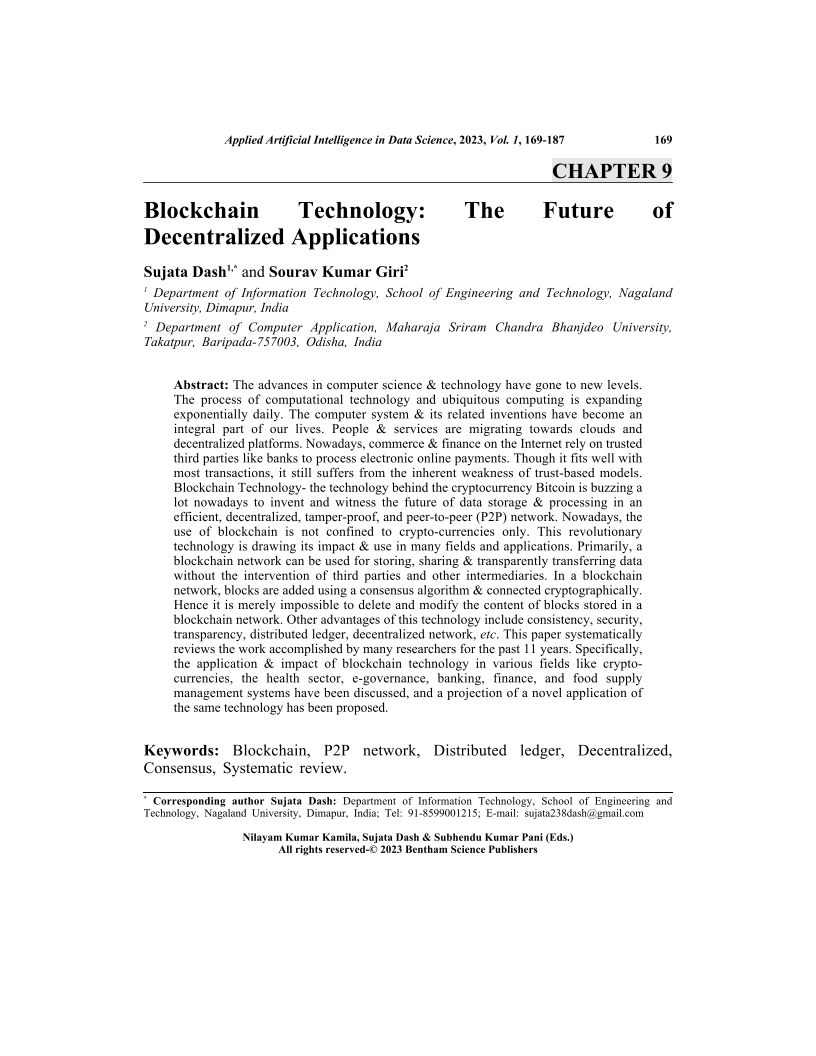Blockchain Technology: The Future of Decentralized Applications

- Authors: Sujata Dash1, Sourav Kumar Giri2
-
View Affiliations Hide Affiliations1 Department of Information Technology, School of Engineering and Technology, Nagaland University, Dimapur, India 2 Department of Computer Application, Maharaja Sriram Chandra Bhanjdeo University, Takatpur, Baripada 757003, Odisha, India
- Source: Blockchain Technology in Healthcare - Concepts,Methodologies, and Applications , pp 169-187
- Publication Date: November 2023
- Language: English
Blockchain Technology: The Future of Decentralized Applications, Page 1 of 1
< Previous page | Next page > /docserver/preview/fulltext/9789815165197/chap9-1.gif
The advances in computer science amp; technology have gone to new levels. The process of computational technology and ubiquitous computing is expanding exponentially daily. The computer system amp; its related inventions have become an integral part of our lives. People amp; services are migrating towards clouds and decentralized platforms. Nowadays, commerce amp; finance on the Internet rely on trusted third parties like banks to process electronic online payments. Though it fits well with most transactions, it still suffers from the inherent weakness of trust-based models. Blockchain Technology- the technology behind the cryptocurrency Bitcoin is buzzing a lot nowadays to invent and witness the future of data storage amp; processing in an efficient, decentralized, tamper-proof, and peer-to-peer (P2P) network. Nowadays, the use of blockchain is not confined to crypto-currencies only. This revolutionary technology is drawing its impact amp; use in many fields and applications. Primarily, a blockchain network can be used for storing, sharing amp; transparently transferring data without the intervention of third parties and other intermediaries. In a blockchain network, blocks are added using a consensus algorithm amp; connected cryptographically. Hence it is merely impossible to delete and modify the content of blocks stored in a blockchain network. Other advantages of this technology include consistency, security, transparency, distributed ledger, decentralized network, etc. This paper systematically reviews the work accomplished by many researchers for the past 11 years. Specifically, the application amp; impact of blockchain technology in various fields like crypto currencies, the health sector, e-governance, banking, finance, and food supply management systems have been discussed, and a projection of a novel application of the same technology has been proposed.
-
From This Site
/content/books/9789815165197.chap9dcterms_subject,pub_keyword-contentType:Journal -contentType:Figure -contentType:Table -contentType:SupplementaryData105

